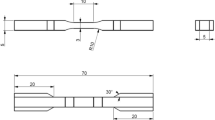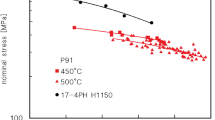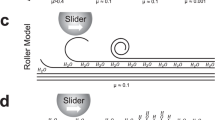Abstract
THE creep behaviour of graphite in the temperature range 1,300–2,000° C. has been examined for the first time. The experiments were carried out by applying loads to cantilevers heated in vacuo by the passage of an electric current and to spring specimens heated in a high-temperature high-vacuum furnace. The specimens were made in the laboratory by extruding a wide range of raw materials (pitch coke, petroleum coke, lamp black, cellulose and natural graphite). Springs of rectangular section were also machined from commercially manufactured materials (reactor graphite and commercial electrode graphite). The apparatus and techniques used in these experiments were similar to those used in dynamic experiments previously described1.
This is a preview of subscription content, access via your institution
Access options
Subscribe to this journal
Receive 51 print issues and online access
$199.00 per year
only $3.90 per issue
Buy this article
- Purchase on Springer Link
- Instant access to full article PDF
Prices may be subject to local taxes which are calculated during checkout
Similar content being viewed by others
References
Davidson, H. W., Losty, H. H. W., and Ross, A. M., “Mechanical Properties of Graphite at Elevated Temperatures”, Soc. Chem. Indust. Conf. on Industrial Carbon and Graphite (Sept. 1957).
Author information
Authors and Affiliations
Rights and permissions
About this article
Cite this article
DAVIDSON, H., LOSTY, H. Plasticity of Graphite. Nature 181, 1057–1059 (1958). https://doi.org/10.1038/1811057b0
Issue Date:
DOI: https://doi.org/10.1038/1811057b0
Comments
By submitting a comment you agree to abide by our Terms and Community Guidelines. If you find something abusive or that does not comply with our terms or guidelines please flag it as inappropriate.



